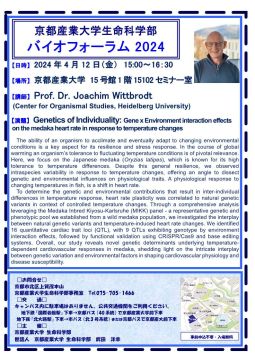【開催中止】【生命科学部】バイオフォーラムを開催します!(4月12日)
2024.04.03
演者の来日がキャンセルされたため開催を中止します
最先端の生命科学研究に触れてみませんか
京都産業大学生命科学部では、ご活躍されている研究者をお招きし、生物学・生命科学に関する講演会「京都産業大学生命科学部バイオフォーラム」を不定期で開催しています。最先端の研究領域に触れる機会を提供することにより、学生・大学院生・教員の学習・研究意欲の向上及び学部・大学院の活性化を図ることを目的としています。
今回は小型魚類を用いた研究で欧州のリーダーの一人であるドイツ・ハイデルベルク大学のJoachim Wittbrodt博士をお招きし「Genetics of Individuality: Gene x Environment interaction effects on the medaka heart rate in response to temperaturechanges」をテーマに、おなじみのメダカを用いた「環境と個体の適応」のPopulation genomicsによる最新の成果を講演していただきます。
一般の方にも生命科学の最先端の研究に触れるいただける機会となります。ぜひ、ご参加ください!
| 日時 | 2024年4月12日(金) 15:00~16:30(14:30開場) |
|---|---|
| 場所 | 京都産業大学 15号館1階15102セミナー室 キャンパスマップ |
| 交通 | ※キャンパス内に駐車場はありません。公共交通機関をご利用ください。 交通アクセス |
| 備考 | 事前申し込み不要・入場無料 |
| 主催 | 京都産業大学 生命科学部 |
講師
Prof. Dr. Joachim Wittbrodt(Center for Organismal Studies, Heidelberg University)
演題
Genetics of Individuality: Gene x Environment interaction effects on the medaka heart rate in response to temperature changes
要旨
The ability of an organism to acclimate and eventually adapt to changing environmental conditions is a key aspect for its resilience and stress response. In the course of global warming an organism’s tolerance to fluctuating temperature conditions is of pivotal relevance. Here, we focus on the Japanese medaka (Oryzias latipes), which is known for its high tolerance to temperature differences. Despite this general resilience, we observed intraspecies variability in response to temperature changes, offering an angle to dissect genetic and environmental influences on physiological traits. A physiological response to changing temperatures in fish, is a shift in heart rate.
To determine the genetic and environmental contributions that result in inter-individual differences in temperature response, heart rate plasticity was correlated to natural genetic variants in context of controlled temperature changes. Performing genome-wide linkage studies provide the unique opportunity to investigate genetic and environmental causes of complex traits in an unbiased and systematic approach. Disentangling the environment-specific effects in genome-wide association studies in humans is challenging and often impossible. Here, the power of model organisms like medaka comes into play for which environmental conditions can be precisely controlled. Through a comprehensive analysis leveraging the Medaka Inbred Kiyosu-Karlsruhe (MIKK) panel - a representative genetic and phenotypic pool we established from a wild medaka population - we investigated the interplay between natural genetic variants and temperature-induced heart rate changes. Phenotypic assessments across 80 genetically distinct MIKK strains revealed significant strain-dependent differences in heart rate across various temperatures. Utilizing strategic strain crossings and a subsequent F2 segregation analysis, we identified 16 quantitative cardiac trait loci (QTL), with 9 QTLs exhibiting genotype by environment interaction effects. Functional validation of candidate genes using CRISPR/Cas9 and base editing systems demonstrated their cardiovascular relevance. Introduction of loss-of-function mutations in these genes replicate the predicted genotype by environment interaction effects, confirming their contribution to temperature-sensitive heart rate regulation. Overall, our study reveals novel genetic determinants underlying temperature-dependent cardiovascular responses in medaka, shedding light on the intricate interplay between genetic variation and environmental factors in shaping cardiovascular physiology and disease susceptibility.
To determine the genetic and environmental contributions that result in inter-individual differences in temperature response, heart rate plasticity was correlated to natural genetic variants in context of controlled temperature changes. Performing genome-wide linkage studies provide the unique opportunity to investigate genetic and environmental causes of complex traits in an unbiased and systematic approach. Disentangling the environment-specific effects in genome-wide association studies in humans is challenging and often impossible. Here, the power of model organisms like medaka comes into play for which environmental conditions can be precisely controlled. Through a comprehensive analysis leveraging the Medaka Inbred Kiyosu-Karlsruhe (MIKK) panel - a representative genetic and phenotypic pool we established from a wild medaka population - we investigated the interplay between natural genetic variants and temperature-induced heart rate changes. Phenotypic assessments across 80 genetically distinct MIKK strains revealed significant strain-dependent differences in heart rate across various temperatures. Utilizing strategic strain crossings and a subsequent F2 segregation analysis, we identified 16 quantitative cardiac trait loci (QTL), with 9 QTLs exhibiting genotype by environment interaction effects. Functional validation of candidate genes using CRISPR/Cas9 and base editing systems demonstrated their cardiovascular relevance. Introduction of loss-of-function mutations in these genes replicate the predicted genotype by environment interaction effects, confirming their contribution to temperature-sensitive heart rate regulation. Overall, our study reveals novel genetic determinants underlying temperature-dependent cardiovascular responses in medaka, shedding light on the intricate interplay between genetic variation and environmental factors in shaping cardiovascular physiology and disease susceptibility.

